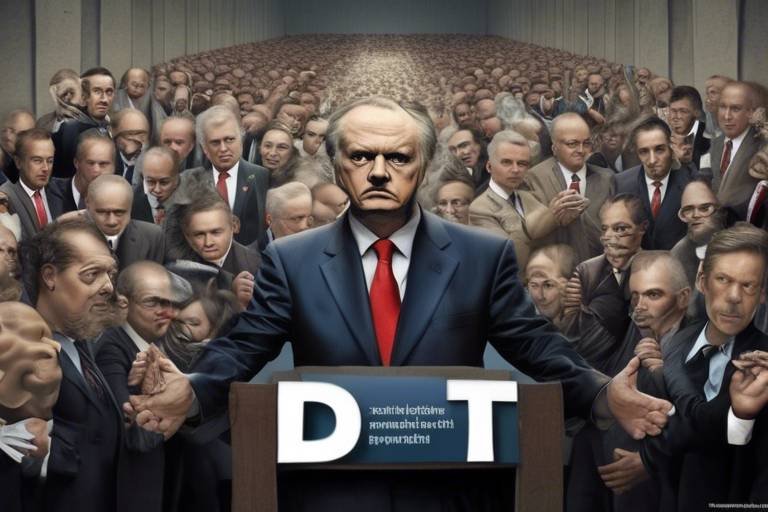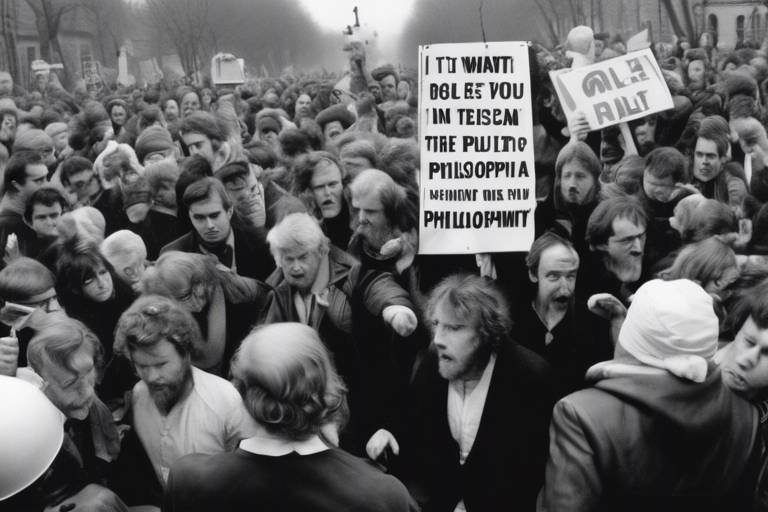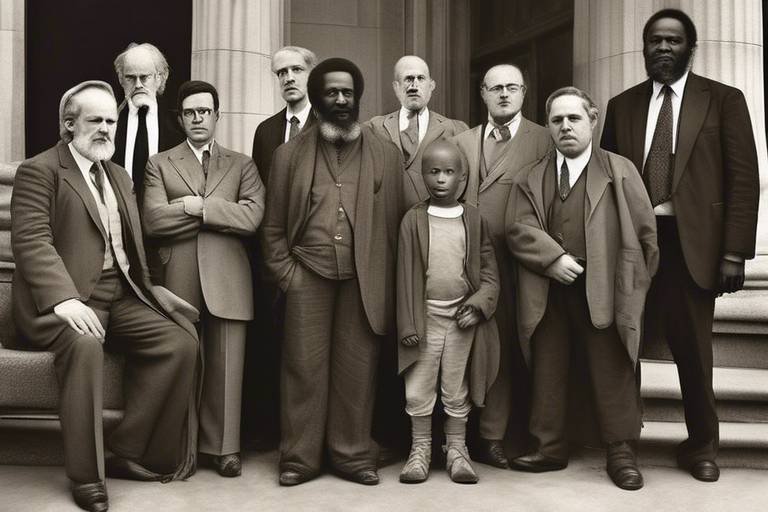Philosophy and Politics: A Pragmatic View
In our ever-evolving world, the intersection of philosophy and politics is a fascinating arena that shapes our societies and influences our lives daily. Imagine a world where every political decision is rooted in a profound understanding of human nature, ethics, and the complexities of governance. This is where philosophy steps in, providing the foundational principles that guide political thought and action. But what happens when these philosophical ideas collide with the gritty realities of political practice? This article dives deep into the pragmatic approaches that seek to reconcile these two realms, illustrating how philosophical frameworks can inform political ideologies and decision-making processes.
Philosophy is not just an abstract discipline confined to dusty books and academic debates; it plays a vital role in shaping the very fabric of political ideologies. From the ancient musings of Plato to the modern theories of governance, philosophical ideas have profoundly influenced how leaders make decisions and how societies structure themselves. For instance, consider the concept of justice. Philosophers like John Rawls have articulated theories that challenge us to think about fairness and equity in political systems. This philosophical inquiry forces politicians to confront difficult questions about who benefits from their policies and the ethical implications of their governance.
Furthermore, the interplay between philosophy and politics invites us to consider the bigger picture. Political decisions are rarely made in a vacuum; they are influenced by cultural, historical, and social contexts. Thus, understanding these philosophical underpinnings helps us grasp the motivations behind political actions and the potential consequences for society at large. As we delve deeper into the pragmatic view, we will uncover how these philosophical ideas can lead to more effective and adaptable political practices.
So, what exactly is pragmatism? At its core, pragmatism is a philosophical approach that evaluates theories based on their practical applications and outcomes. It’s about asking, “Does this work in the real world?” rather than getting lost in abstract ideals. This focus on practicality makes pragmatism particularly relevant in contemporary political discourse, where the challenges we face are often complex and multifaceted.
Pragmatism encourages us to prioritize solutions that yield tangible results, which can be a refreshing change from the often dogmatic nature of political ideologies. By embracing a pragmatic approach, leaders can adapt to changing circumstances and make informed decisions that reflect the needs of their constituents. Whether it’s addressing climate change, economic inequality, or social justice, pragmatism offers a flexible framework that prioritizes effectiveness over rigid adherence to ideology.
To fully appreciate the impact of pragmatism on political thought, it’s essential to understand its historical context. Emerging in the late 19th century, pragmatism was shaped by key figures such as Charles Sanders Peirce, William James, and John Dewey. Each of these thinkers contributed to a growing body of work that emphasized the importance of experience and practical consequences in shaping knowledge and belief.
For example, William James famously stated that the truth of an idea is measured by its practical effects. This perspective laid the groundwork for a political philosophy that values adaptability and flexibility—qualities that are crucial in today’s fast-paced world. As we explore the contributions of these thinkers, we will see how their ideas have influenced political theory and practice, paving the way for a more pragmatic approach to governance.
Among the most influential pragmatist philosophers, William James and John Dewey stand out for their profound contributions to both philosophy and political theory. James, often regarded as the father of pragmatism, emphasized the importance of individual experience and the practical implications of belief. His ideas encourage a political landscape where policies are evaluated based on their real-world effects rather than ideological purity.
On the other hand, John Dewey extended pragmatism into the realm of education and democracy. He believed that democracy should be a living experience, shaped by the active participation of individuals in their communities. Dewey’s vision of a participatory democracy has had lasting implications for political engagement and civic responsibility, urging citizens to take an active role in shaping their political environment.
The evolution of pragmatism reflects the changing values and challenges of society. As we navigate the complexities of modern political landscapes, pragmatism adapts to address pressing issues such as social justice, environmental sustainability, and economic inequality. This adaptability is one of pragmatism’s greatest strengths, allowing it to remain relevant in a world that is constantly in flux.
In conclusion, the intersection of philosophy and politics, viewed through a pragmatic lens, offers a rich tapestry of insights and possibilities. By grounding political decisions in practical realities and ethical considerations, we can aspire to create a more just and effective society. As we continue to explore the nuances of this relationship, we invite you to consider how these ideas resonate in your own political beliefs and actions.
- What is pragmatism in politics? Pragmatism in politics is an approach that prioritizes practical outcomes over ideological consistency, focusing on what works in real-world scenarios.
- Who are the key figures in pragmatism? Key figures include Charles Sanders Peirce, William James, and John Dewey, each contributing significantly to the development of pragmatic philosophy.
- How does pragmatism influence political decision-making? Pragmatism encourages leaders to evaluate policies based on their effectiveness and adaptability to changing circumstances, rather than adhering strictly to ideological frameworks.

The Role of Philosophy in Politics
Philosophy serves as the bedrock of political thought, providing the essential principles that shape how societies govern themselves. It's like the blueprint for a house; without it, the structure would lack stability and coherence. Political ideologies—whether liberalism, conservatism, socialism, or any other—are deeply rooted in philosophical ideas. These ideologies guide leaders in their decision-making processes, influencing everything from legislation to public policy.
At its core, philosophy asks fundamental questions about justice, rights, and the nature of power. For instance, consider the philosophical debates surrounding individual rights versus the collective good. How do we ensure that individual freedoms are respected while also promoting societal welfare? This tension is not just academic; it plays out in real-world political debates and decisions every day. Philosophers like John Locke and Thomas Hobbes have shaped our understanding of these concepts, leading to frameworks that inform modern governance.
Moreover, philosophy encourages critical thinking and ethical considerations in political discourse. It pushes us to question the status quo and consider the implications of our choices. In a world where political polarization is rampant, philosophical inquiry can serve as a bridge, fostering dialogue and understanding among differing viewpoints. This is particularly important in contemporary politics, where the stakes are high, and the need for nuanced discussion is greater than ever.
To illustrate, let’s consider a few key philosophical concepts that have influenced political systems:
| Philosophical Concept | Influence on Politics |
|---|---|
| Social Contract | Foundational for democratic governance; emphasizes mutual agreement between the state and its citizens. |
| Utilitarianism | Guides policy-making by prioritizing the greatest good for the greatest number. |
| Libertarianism | Advocates for minimal state intervention, stressing individual freedom and autonomy. |
In addition to these concepts, philosophy also addresses the ethical dimensions of power. What responsibilities do leaders have to their constituents? How should they balance personal interests with the public good? These questions force politicians to confront their values and the impact of their decisions. As a result, philosophy not only informs political ideologies but also shapes the moral framework within which political actions occur.
In conclusion, the role of philosophy in politics is both profound and multifaceted. It influences ideologies, shapes ethical considerations, and fosters critical dialogue. As we navigate the complexities of modern governance, embracing philosophical inquiry can lead to more thoughtful and effective political practices. So, the next time you engage in political discussions, remember that a solid understanding of philosophy can illuminate the path toward more informed and principled decision-making.

Pragmatism Defined
Pragmatism is more than just a buzzword in political discourse; it's a philosophical approach that emphasizes the importance of practical consequences in evaluating theories and beliefs. At its core, pragmatism asks the fundamental question: "Does this idea work in real life?" This question is crucial because it shifts the focus from abstract principles to tangible results, making it incredibly relevant in today’s fast-paced political landscape. Rather than getting bogged down in ideological debates, pragmatists look for what is effective and beneficial for society as a whole.
One of the key tenets of pragmatism is its rejection of absolute truths. Instead of adhering to rigid doctrines, pragmatists advocate for flexibility and adaptability in thought and action. This means that policies and political strategies should be evaluated based on their outcomes and ability to solve real-world problems. For instance, a pragmatic approach to healthcare reform would prioritize solutions that improve patient outcomes and accessibility, rather than getting caught up in partisan ideologies.
Pragmatism also encourages collaboration and dialogue among diverse groups. In a world where political polarization is rampant, this aspect of pragmatism is particularly appealing. By focusing on shared goals and practical solutions, pragmatists can foster a spirit of cooperation that transcends traditional party lines. This approach not only enhances the effectiveness of governance but also promotes social cohesion, as people from different backgrounds work together towards common objectives.
To illustrate the principles of pragmatism, consider the following table that outlines its fundamental characteristics compared to more traditional philosophical approaches:
| Characteristic | Pragmatism | Traditional Philosophy |
|---|---|---|
| Focus | Practical outcomes | Absolute truths |
| Flexibility | Highly adaptable | Rigid and dogmatic |
| Collaboration | Encourages dialogue | Often divisive |
| Evaluation | Based on results | Based on principles |
In summary, pragmatism is not just a theoretical framework; it’s a way of approaching life and politics that prioritizes effectiveness, adaptability, and collaboration. By focusing on what works, pragmatism offers a refreshing alternative to the often stagnant debates that characterize traditional political discourse. In a world that demands quick and effective solutions, embracing a pragmatic mindset could be the key to navigating the complexities of modern governance.

Historical Context of Pragmatism
Understanding the historical context of pragmatism is essential to grasp its profound impact on political thought and practice. Pragmatism emerged in the late 19th century in the United States, a time when the nation was grappling with rapid industrialization, social upheaval, and the complexities of modern life. Thinkers like Charles Sanders Peirce, William James, and John Dewey were at the forefront of this intellectual movement, each contributing unique perspectives that helped shape pragmatism into a powerful philosophical approach.
Initially, pragmatism was a response to the rigid and often abstract principles of traditional philosophy. It sought to ground ideas in real-world applications and outcomes. This shift was particularly relevant during a period when society was experiencing significant changes, including the rise of democracy, the expansion of education, and the increasing influence of science and technology. Pragmatists believed that ideas should be evaluated based on their practical consequences, which resonated with a public eager for solutions to pressing social issues.
The philosophical roots of pragmatism can be traced back to earlier philosophical traditions, including empiricism and utilitarianism. However, pragmatism distinguished itself by emphasizing the importance of the process of inquiry and the dynamic nature of truth. Rather than viewing truth as an absolute, pragmatists argued that it is something that evolves based on experience and experimentation. This perspective not only influenced philosophical discourse but also permeated political theory, encouraging leaders to adopt more flexible and adaptive approaches to governance.
Throughout the 20th century, pragmatism continued to evolve and adapt to changing societal values. For instance, the civil rights movement and the rise of environmentalism prompted pragmatists to reconsider their approaches to justice and sustainability. The ability to integrate new ideas and respond to contemporary challenges has been a hallmark of pragmatism, allowing it to remain relevant in today’s complex political landscape.
Key figures in the development of pragmatism, such as William James, emphasized the importance of individual experience and the subjective nature of truth. His famous dictum, "The truth of an idea is not a stagnant property inherent in it. It becomes true, is made true by events," captures the essence of pragmatic thought. Similarly, John Dewey advocated for a philosophy of education that emphasized experiential learning and the role of democracy in fostering social progress.
In summary, the historical context of pragmatism is rich and multifaceted. It reflects a response to the challenges of its time, fostering a philosophy that values practical outcomes and adaptability. As we navigate the complexities of modern politics, the lessons drawn from pragmatism's historical development continue to offer valuable insights into how we can approach governance and societal issues more effectively.
- What is pragmatism? Pragmatism is a philosophical approach that evaluates theories based on their practical applications and outcomes.
- Who are the key figures in pragmatism? Important thinkers include Charles Sanders Peirce, William James, and John Dewey.
- How does pragmatism relate to politics? Pragmatism influences political thought by emphasizing flexible, outcome-oriented approaches to governance and policy-making.
- What are some criticisms of pragmatism? Critics often argue that pragmatism can lead to moral relativism and a lack of commitment to principles.

Key Thinkers in Pragmatism
When diving into the world of pragmatism, it's impossible to overlook the towering figures who shaped its foundations. William James and John Dewey are two of the most prominent thinkers whose ideas not only influenced philosophy but also had profound implications for political theory. James, often referred to as the father of pragmatism, championed the notion that the truth of an idea is determined by its practical consequences. He believed that ideas must be tested in real-world situations, a perspective that resonates deeply within political discourse. Imagine a political leader making decisions based solely on theoretical ideals without considering the actual outcomes—James would argue that such an approach is fundamentally flawed.
On the other hand, John Dewey expanded upon James's principles, focusing on the role of education and democracy in fostering a pragmatic society. Dewey viewed democracy not just as a political system but as a way of life. He emphasized the importance of public engagement and the need for citizens to actively participate in the political process. For Dewey, the best policies emerge from collective experiences and discussions, much like a potluck dinner where everyone brings a dish to the table, creating a richer and more diverse meal. His thoughts on participatory democracy continue to inspire modern political movements that advocate for grassroots involvement.
Another key figure worth mentioning is Charles Sanders Peirce, often regarded as the 'father of pragmatism' alongside James. Peirce introduced the idea of the pragmatic maxim, which posits that the meaning of any concept can be understood by considering its practical effects. This idea challenges us to look beyond abstract theories and consider how our beliefs manifest in the real world. Imagine trying to understand a complex political theory without considering its implications on people's lives; Peirce would argue that such an understanding is incomplete.
These thinkers laid the groundwork for a pragmatic approach to political issues, advocating for policies that are adaptable and responsive to the needs of society. Their contributions remind us that philosophy is not just an academic exercise but a vital tool for navigating the complexities of governance. By integrating their ideas into contemporary political discourse, we can better address the challenges we face today.
In summary, the insights provided by William James, John Dewey, and Charles Sanders Peirce are invaluable for anyone looking to understand the intersection of philosophy and politics. They challenge us to think critically about the effectiveness of our political systems and encourage us to seek solutions that are grounded in reality rather than abstract ideals. As we continue to grapple with pressing political issues, the pragmatic lens they offer can guide us toward more effective and inclusive governance.
- What is pragmatism in philosophy? Pragmatism is a philosophical approach that evaluates theories based on their practical applications and outcomes, emphasizing the importance of real-world effects.
- Who are the main figures in pragmatism? Key figures include William James, John Dewey, and Charles Sanders Peirce, each contributing significantly to the development of pragmatic thought.
- How does pragmatism relate to politics? Pragmatism informs political decision-making by focusing on the effectiveness and adaptability of policies, ensuring they meet the needs of society.
- What are some criticisms of pragmatism? Critics argue that pragmatism can lead to moral relativism and a lack of commitment to principles, raising concerns about its implications for political engagement.

Pragmatism's Evolution
Pragmatism has undergone a significant transformation since its inception in the late 19th century, reflecting the dynamic nature of society and the political landscape. Initially, pragmatism emerged as a response to the rigid doctrines of philosophical idealism and dogmatism. Thinkers like William James and John Dewey championed a philosophy that prioritized practical consequences and real-world applications over abstract principles. This shift was not just theoretical; it marked a profound change in how people began to perceive and engage with politics.
As the 20th century unfolded, pragmatism adapted to various social movements, including civil rights, feminism, and environmentalism. Each of these movements brought forth new challenges that required flexible and innovative solutions. For instance, the civil rights movement demanded a reevaluation of justice and equality, pushing pragmatist thinkers to address issues of race and power dynamics in a way that resonated with the lived experiences of individuals. This evolution illustrates how pragmatism can serve as a responsive tool, capable of addressing the pressing concerns of its time.
Moreover, the evolution of pragmatism can be seen in the way it has influenced political policies and governance. In contemporary politics, leaders often face complex issues that lack straightforward solutions. Here, pragmatism shines as it encourages decision-makers to focus on what works best in practice, rather than adhering strictly to ideological commitments. This approach fosters an environment where policies can be tested, evaluated, and adjusted based on their outcomes, leading to more effective governance.
To further illustrate this evolution, consider the following table that highlights key phases in the development of pragmatism:
| Time Period | Key Developments | Influential Thinkers |
|---|---|---|
| Late 19th Century | Foundation of Pragmatism | Charles Sanders Peirce, William James |
| Early 20th Century | Expansion into Education and Social Reform | John Dewey, Jane Addams |
| Mid 20th Century | Integration with Social Movements | Herbert Mead, Richard Rorty |
| 21st Century | Application in Global Politics and Technology | Hilary Putnam, Cornel West |
In summary, the evolution of pragmatism reflects a continual adaptation to the changing needs and values of society. By embracing a flexible and results-oriented approach, pragmatism has proven to be a vital framework for understanding and addressing the complexities of modern political life. As we move forward, the challenge lies in maintaining this adaptability while ensuring that we do not lose sight of our core values and ethical commitments.
- What is pragmatism? Pragmatism is a philosophical approach that assesses the truth of beliefs based on their practical implications and real-world applications.
- Who were the key figures in the development of pragmatism? Key figures include William James, John Dewey, and Charles Sanders Peirce, who laid the groundwork for this philosophical movement.
- How does pragmatism apply to politics today? Pragmatism informs political decision-making by encouraging leaders to focus on effective solutions rather than rigid ideologies, allowing for more adaptable governance.
- What are the criticisms of pragmatism? Critics argue that pragmatism may lead to moral relativism or a lack of commitment to principles, challenging the integrity of political engagement.

Pragmatic Approaches to Political Issues
When we think about political issues, the complexity can be overwhelming, right? Often, it feels like we’re stuck in a maze of ideologies, policies, and partisan debates. However, a pragmatic approach can cut through the noise, focusing on what actually works rather than what sounds good on paper. Pragmatism in politics is about seeking solutions that are effective and adaptable to real-world situations. It’s like choosing a tool from a toolbox; the right tool can make all the difference in getting the job done efficiently.
One of the key aspects of pragmatic politics is its emphasis on evidence-based decision-making. Politicians and policymakers who adopt this approach prioritize data and outcomes over rigid adherence to ideology. For instance, when addressing issues like climate change, a pragmatic politician might support a mix of renewable energy incentives, regulatory reforms, and technological innovations rather than sticking to a single ideological stance. This flexibility allows for a more comprehensive strategy that can adapt as new information emerges.
Moreover, pragmatic approaches encourage collaboration across party lines. In a world where political polarization is rampant, finding common ground can seem like searching for a needle in a haystack. However, pragmatism invites dialogue and cooperation. Leaders who embrace this mindset are more likely to engage in cross-party negotiations, recognizing that diverse perspectives can lead to more robust solutions. It’s akin to assembling a diverse team for a project; each member brings unique skills that contribute to the overall success.
To illustrate the effectiveness of pragmatic approaches, consider the following examples:
| Political Issue | Pragmatic Solution | Outcome |
|---|---|---|
| Healthcare Reform | Combining public options with private insurance | Increased access while maintaining choice |
| Gun Control | Implementing background checks and mental health support | Reduced gun violence without infringing on rights |
| Education Policy | Investing in both public schools and charter systems | Improved educational outcomes across demographics |
These examples showcase how pragmatic solutions can lead to tangible benefits. Of course, it’s essential to acknowledge that no single approach is without its challenges. Critics of pragmatism often argue that it can lead to compromises that sacrifice core values. However, the truth is that in the messy world of politics, some level of compromise is often necessary to achieve meaningful change. It’s about finding a balance between what is ideal and what is achievable, much like walking a tightrope.
Ultimately, a pragmatic approach to political issues encourages us to focus on results. It’s about asking the right questions: What will work? How can we adapt to changing circumstances? By prioritizing practical solutions over ideological purity, we can foster a political environment that is not only more effective but also more inclusive. After all, isn’t the goal of politics to create a better society for everyone?
- What is pragmatism in politics? Pragmatism in politics refers to an approach that prioritizes practical solutions and evidence-based decision-making over strict adherence to ideological beliefs.
- How can pragmatism improve political discourse? By encouraging collaboration and flexibility, pragmatism fosters dialogue across party lines, leading to more effective and inclusive political solutions.
- Are there any downsides to a pragmatic approach? Critics argue that pragmatism can lead to moral relativism or compromise core values, but it can also facilitate necessary negotiations for achieving real-world outcomes.

Challenges to Pragmatic Politics
While pragmatism offers a refreshing lens through which to view political issues, it is not without its challenges. One of the most significant hurdles that pragmatic politics faces is the perception that it can lead to a form of moral relativism. Critics argue that by prioritizing practical outcomes over absolute principles, pragmatic approaches may undermine the ethical foundations that guide political action. This concern raises a critical question: can we truly achieve effective governance if we constantly shift our moral compass based on the situation at hand?
Moreover, in the fast-paced world of politics, where decisions often need to be made quickly, the emphasis on practicality can sometimes overshadow the need for principled leadership. Leaders who adopt a pragmatic stance may be viewed as opportunistic, willing to compromise on core values for the sake of expediency. This perception can erode public trust and diminish the legitimacy of political institutions. As citizens, we crave leaders who stand firm in their beliefs, yet pragmatism demands flexibility and adaptability. This tension creates a complex landscape for political engagement.
Another challenge is the difficulty in measuring the success of pragmatic policies. Unlike idealistic approaches that often have clear, defined goals, pragmatic solutions can be more ambiguous. For instance, a policy aimed at reducing poverty might be deemed successful if it improves the economic situation of some individuals, but what about those who remain marginalized? The lack of universally accepted metrics for success complicates the evaluation of pragmatic approaches, leading to debates over whether a particular policy was truly effective or merely a temporary fix.
Furthermore, the ever-changing political landscape poses a significant challenge to pragmatic politics. As social values evolve, so too must the policies that govern society. This constant flux can lead to a sense of instability, where pragmatic leaders may find themselves caught in a cycle of reacting to new challenges rather than proactively shaping a vision for the future. The question then becomes: how can leaders maintain a pragmatic approach while also fostering a sense of long-term stability in governance?
Despite these challenges, it is essential to recognize that pragmatism is not inherently flawed; rather, it requires a delicate balance. Integrating the insights of both pragmatic and idealistic perspectives can lead to a more nuanced and effective political dialogue. By acknowledging the limitations of each approach, political actors can work towards solutions that are not only practical but also principled. This integration might involve engaging with diverse stakeholders, fostering open discussions, and being willing to adapt while remaining committed to core values.
- What is pragmatic politics? Pragmatic politics is an approach that prioritizes practical solutions and outcomes over strict adherence to ideological principles.
- What are the main challenges of pragmatic politics? Key challenges include the risk of moral relativism, the perception of opportunism, difficulties in measuring success, and the need for adaptability in a changing landscape.
- How can pragmatic and idealistic approaches be balanced? By recognizing the strengths and weaknesses of both perspectives, political actors can create solutions that are both effective and principled, engaging in open dialogue and stakeholder involvement.

Critiques of Pragmatism
While pragmatism offers a refreshing lens through which to view political issues, it is not without its detractors. Critics often argue that pragmatism can lead to a form of moral relativism, where the absence of absolute principles results in a slippery slope toward ethical ambiguity. This perspective raises a crucial question: if we prioritize outcomes over ideals, do we risk sacrificing our core values at the altar of practicality? The fear is that in the quest for effective solutions, we might become too flexible, bending our moral compass to suit the whims of political expediency.
Moreover, some argue that pragmatism can foster a lack of commitment to long-term goals. In a world where political landscapes shift rapidly, the pragmatic approach may encourage leaders to make decisions based on immediate benefits rather than sustainable change. This can lead to a cycle of reactive governance, where policies are implemented hastily to address current crises, but without a coherent vision for the future. As a result, we might find ourselves in a political environment that is constantly in flux, with no clear direction or purpose.
Another significant critique revolves around the idea that pragmatism can dilute the power of idealism in politics. Idealism often serves as a driving force for social movements and reform; it inspires individuals to strive for a better society based on principles of justice, equality, and freedom. When pragmatism takes center stage, these lofty ideals may be sidelined in favor of what is politically feasible. This raises an important dilemma: should we aim for achievable goals that may compromise our values, or should we hold fast to our ideals, even if they seem out of reach?
In the realm of political engagement, critics also highlight the potential for pragmatism to foster a sense of disillusionment among citizens. When political leaders prioritize practical solutions that may not align with the public's aspirations, it can lead to a growing disconnect between the government and the governed. This disconnection can manifest in a lack of trust and engagement in the political process, as people may feel that their voices are not being heard or valued. To illustrate this, consider the following table that summarizes the key critiques:
| Critique | Description |
|---|---|
| Moral Relativism | Risk of sacrificing core values for practical outcomes. |
| Lack of Long-term Commitment | Focus on immediate solutions may hinder sustainable change. |
| Undermining Idealism | Pragmatism may dilute the power of lofty ideals in politics. |
| Public Disillusionment | Disconnect between leaders and citizens can lead to distrust. |
In conclusion, while pragmatism provides valuable insights and strategies for addressing political challenges, it is essential to remain aware of its limitations. Balancing pragmatic approaches with a commitment to core values and long-term goals is vital for creating a political landscape that is not only effective but also principled and inclusive. As we navigate the complexities of modern governance, the challenge lies in finding that delicate equilibrium between what is practical and what is right.
- What is pragmatism in politics? Pragmatism in politics refers to an approach that emphasizes practical solutions and outcomes over rigid adherence to ideological principles.
- Why do critics argue against pragmatism? Critics argue that pragmatism can lead to moral relativism, a lack of commitment to long-term goals, and a dilution of idealistic values.
- How can pragmatism and idealism coexist in politics? By integrating pragmatic solutions with a strong commitment to core values and long-term objectives, policymakers can create effective and principled political action.

Balancing Pragmatism and Idealism
In the complex world of politics, finding the sweet spot between pragmatism and idealism can feel like walking a tightrope. On one side, you have pragmatism, which emphasizes practical solutions and adaptability. On the other, idealism champions lofty principles and visions for a better society. The challenge lies in recognizing that both perspectives have their merits and can coexist to create a more effective political landscape.
Imagine a ship navigating through turbulent waters. The captain (representing political leaders) must balance the need for a sturdy, reliable vessel (pragmatism) with the dream of reaching a distant, idyllic island (idealism). If the captain focuses solely on the destination, they might ignore the immediate challenges of the stormy seas. Conversely, if they only pay attention to the ship's functionality, they risk drifting aimlessly without a clear goal. This analogy illustrates the delicate balance that must be struck in political decision-making.
To achieve this balance, political leaders can adopt several strategies:
- Embrace Flexibility: Leaders should remain open to adjusting their approaches based on new information and changing circumstances. This adaptability is a hallmark of pragmatism.
- Articulate a Vision: While being practical, it’s crucial to have a clear vision or set of principles that guide decision-making. This idealistic component serves to inspire and motivate both leaders and constituents.
- Engage in Dialogue: Open conversations with diverse stakeholders can help bridge the gap between pragmatic solutions and idealistic goals. By listening to various perspectives, leaders can craft policies that resonate with a broader audience.
Moreover, integrating pragmatism and idealism can lead to innovative solutions that are both effective and principled. For instance, consider environmental policies. A pragmatic approach might focus on immediate actions like reducing carbon emissions through technological advancements. However, an idealistic vision would aim for a sustainable future where environmental justice is prioritized. By combining these two approaches, policymakers can create comprehensive strategies that address urgent issues while also striving for long-term goals.
In practice, this balance often requires compromise. Political leaders may need to make concessions to achieve practical outcomes that align with their values. This does not mean abandoning principles; rather, it involves a nuanced understanding of when to stand firm and when to adapt. The ability to navigate these waters effectively can lead to more resilient governance.
Ultimately, the interplay between pragmatism and idealism is not a zero-sum game. Instead, it’s about recognizing that both are essential to fostering a political environment that is responsive, responsible, and transformative. By skillfully balancing these two forces, leaders can not only address the immediate needs of their constituents but also pave the way for a brighter, more equitable future.
Q1: Why is it important to balance pragmatism and idealism in politics?
A1: Balancing these two perspectives allows leaders to create effective policies that are grounded in reality while still aspiring to higher ethical standards and long-term goals.
Q2: How can political leaders practice this balance?
A2: Leaders can practice this balance by remaining flexible in their approaches, articulating a clear vision, and engaging in dialogue with diverse stakeholders to ensure their policies are both practical and principled.
Q3: Can you give an example of where this balance has worked?
A3: Yes, environmental policies that combine immediate technological solutions with a long-term vision for sustainability illustrate how pragmatism and idealism can work together effectively.
Frequently Asked Questions
- What is the relationship between philosophy and politics?
Philosophy and politics are deeply intertwined. Philosophy provides the foundational principles that guide political thought and action. It shapes the ideologies of leaders and influences decision-making processes, ultimately impacting society as a whole.
- What is pragmatism in political theory?
Pragmatism is a philosophical approach that evaluates ideas based on their practical applications and outcomes. In political theory, it emphasizes flexibility and effectiveness, allowing policymakers to adapt their strategies based on real-world results rather than rigid ideologies.
- Who are the key thinkers associated with pragmatism?
Some of the most influential figures in pragmatism include William James and John Dewey. Their contributions have significantly shaped both philosophical thought and political theory, promoting a focus on practical solutions to complex problems.
- How has pragmatism evolved over time?
Pragmatism has evolved to reflect changes in societal values and political landscapes. As new challenges arise, pragmatism adapts, allowing it to remain relevant in addressing contemporary issues and ideological shifts.
- What are some challenges to pragmatic politics?
While pragmatism offers valuable insights, it faces criticism for potentially leading to moral relativism or a lack of commitment to principles. Critics argue that this can undermine the integrity of political engagement, presenting a significant challenge for pragmatic approaches.
- How can one balance pragmatism and idealism in politics?
Finding a balance between pragmatic solutions and idealistic goals is essential. Strategies for integrating both perspectives include open dialogue, flexibility in policy-making, and a commitment to core values while being responsive to practical realities.



















